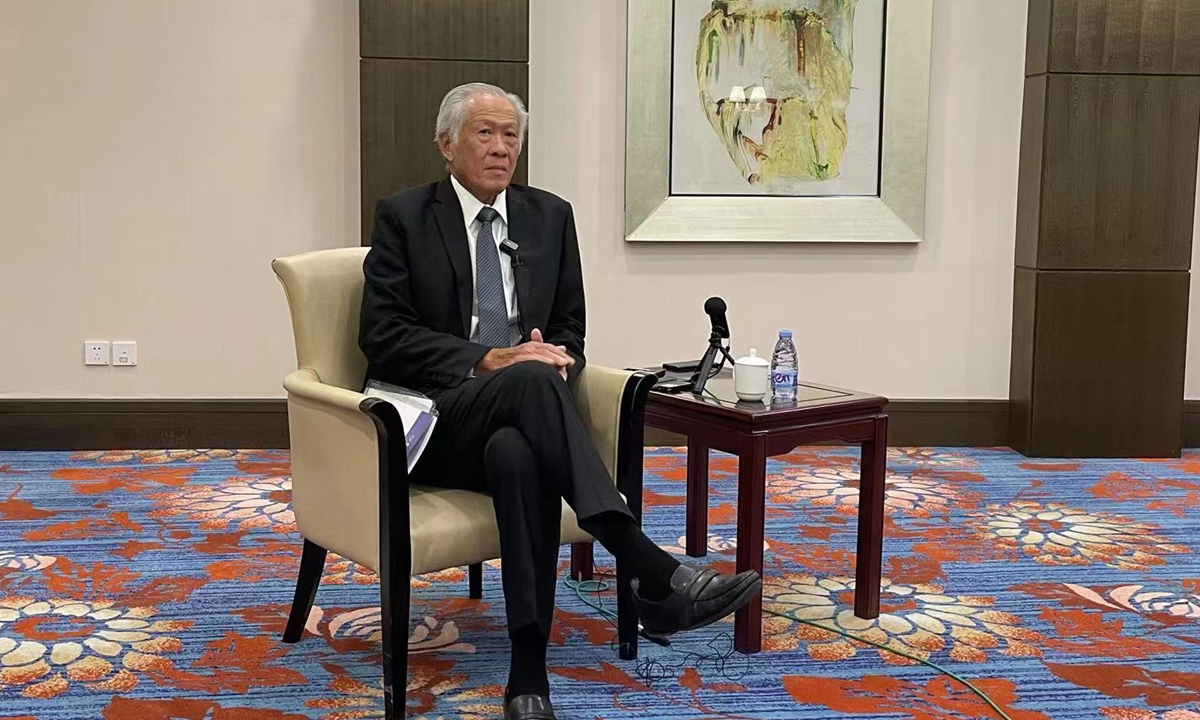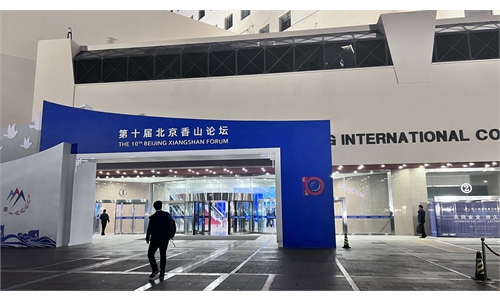Without China, US coming together, world will be dangerous and brittle: Singaporean defense minister

Singapore Defense Minister Ng Eng Hen Photo: Li Aixin
Military engagement is vital - if you are friends, it builds up confidence, if you are potential adversaries, it reduces the risk of miscalculation, Singapore Defense Minister Ng Eng Hen told the Global Times on Wednesday during a doorstop interview, as he wrapped up a four-day visit to Beijing.This year witnessed frequent Singaporean high-level visits to China. From March 27 to April 1, Singaporean Prime Minister Lee Hsien Loong made an official visit to China's three cities, Guangzhou, Guangdong Province, Bo'ao, Hainan Province and Beijing. Singaporean Deputy Prime Minister and Minister for Finance Lawrence Wong visited China in May. At the end of October, Dr Ng attended the 10th Beijing Xiangshan Forum and delivered a plenary speech.
At the same time, interactions between the Chinese and Singaporean military forces have been on the rise this year. The two sides held Exercise Maritime Cooperation, a bilateral maritime drill from 28 April to 1 May. And the China-Singapore "Cooperation-2023" Joint Army Training took place in Singapore from late August to mid-September.
Some Western media outlets and observers view the China-Singapore joint exercises from the backdrop of increasing geopolitical tensions. In April, Reuters noted the drills took place as "Beijing deepens its defense and security ties with Southeast Asia, a region with strong existing US alliances."
Bilateral exchanges between the People's Liberation Army and Singapore Armed Forces are open, Dr Ng told the Global Times, adding that "Our basis for engaging any military in the world is the same."
Dr Ng said, "if you are friends, military engagement builds up confidence, it builds up understanding, but there are more reasons to have an exchange between potential adversaries. If you don't, the risk of miscalculation, misunderstanding, and wrong assessment, increases.''
On the sidelines of the Beijing Xiangshan Forum, General He Weidong, vice chairman of the Central Military Commission of the People's Republic of China, met with Dr Ng on Tuesday.
According to a press release from the Chinese Ministry of National Defense, General He stated that China is willing to maintain a good momentum of cooperation with Singapore and firmly opposes hegemony and bullying, jointly resisting decoupling, and benefiting the peoples of both countries and the region. He hopes that the Chinese and Singaporean militaries will further enhance mutual trust, deepen cooperation, strengthen multilateral coordination, and contribute to maintaining peace and stability in the South China Sea region.
Speaking to the media on Wednesday, Dr Ng said involved parties should de-escalate the situation in the South China Sea and avoid, at all cost, a conflict in Asia.
During his speech at Beijing Xiangshan Forum on Tuesday, he stressed that "for this coming decade, the most important task for all security chiefs is to avoid a physical conflict in Asia. What has happened in Europe and the Middle East must never occur here. Simultaneous conflicts in Asia, Europe and the Middle East will be catastrophic for our World."
Both the US and China will continue to be economic and military powers. The differences in ideology, political and value systems will always exist between the two. The world won't be better off if either the US or China declines, said Dr Ng in his speech. He also emphasized "We need both a strong US and a strong China if we are to effectively address global challenges.''
"I don't believe that the US is in decline, not at least for the next number of decades. I believe that China will continue to grow. It has its inherent strengths in science, engineering … Because both will continue to be strong, they will have to come to a mutual accommodation. Without them coming together, our world will be more dangerous and brittle," Dr Ng told media on Wednesday.
On the same day, Chinese Foreign Ministry spokesperson Wang Wenbin said China and the US agreed to work together toward a San Francisco summit. When asked about the potential meeting between the two leaders, Dr Ng expressed optimism, noting expectations should be realistic, as they're not at the stage where they can aim for resolution of core differences. But there are areas that they can work on to build confidence, ranging from economy, defense, to transnational global threats like climate change and conflicts in Gaza, he added.
The point is, according to Dr Ng, to see continuity in the bilateral ties - whatever is achievable or whatever has been agreed upon, doesn't get disrupted by the balloon incident or other issues.

